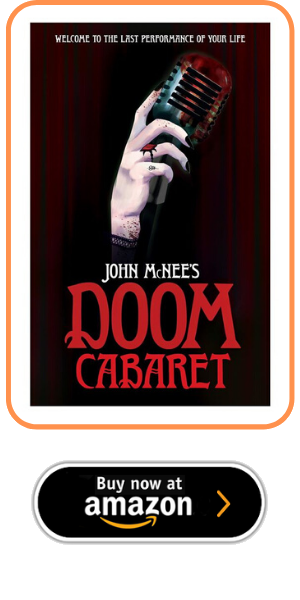it remains a consistently fascinating historical artefact to this day, and nowhere moreso than in its soundscape, whose tracts are as alien and evocatively desolate as those of the Pine Barrens themselves. When it comes to horror soundtracks, Found Footage and Documentary horror films aren't necessarily the most ideal subjects. For the most part, their reliance on verisimilitude means that any score they boast is minimal at best, usually consisting of simple themes or -as in The Blair Witch Project's case- a single, resonant chord that repeats over the end credits. Factors such as background or incidental music are, obviously, abandoned in favour of vast, resonant silences and environmental soundscapes, in order to enhance the impression of sincere footage rather than a contrivance of fiction. However, there are exceptions that prove the rule: The Last Broadcast garnered something of a cult status in the wake of The Blair Witch Project phenomena. The latter film having introduced mainstream audiences to the concept of Found Footage horror, The Last Broadcast errs more towards the documentary format, marketing itself as an exploratory work by an amateur film-maker in his apparent search for the truth regarding a series of grizzly and violent murders that occurred in the USA pine barrens. As a result, unlike the footage of The Blair Witch Project, The Last Broadcast is a necessarily more cultivated work, aping the editing and framing of TV documentaries familiar to 1990s audiences. It therefore boasts its own unique and fascinating soundtrack; one that mingles the realist silences and profound absences of Found Footage pieces with chilling incidental work, designed to convey a particular ethos on behalf of the in-fiction film-maker, and elicit emotional reaction in the manner of a more traditional horror film. The score of The Last Broadcast is itself part of the fundamental illusion: in order for the horror of the film to work, we as the audience must be able to suspend disbelief to a degree, and allow ourselves into the world of the documentary-maker himself. As such, the score is a peculiar beast: Throughout, the host attempts to cultivate a narrative that incorporates everything from cryptozoology -the murders having taken place whilst the victims were on the hunt for the mythic “Jersey Devil”- to potentially supernatural occurrences. He makes comment upon the almost ritualistic, mystical nature of film-making; how demons might be summoned or monsters born on the interstice between electronic image, sound, broadcast and audience participation. Thematically, this makes the piece a sincere companion to 1992's BBC Halloween project, Ghostwatch, which explores similarly esoteric concepts. Between the scraps of silence and strangely quilted, almost priestly dialogue of our host, are scraps of music that derive from a variety of eclectic sources, some ostensibly cribbed from what scattered archives existed back in the day, others purportedly from recordings created by the man framed for the murders themselves, Jim Seward. In every instance, the pieces selected are subtle, eerie and resonant, echoing the vast, almost alien emptiness of the Pine Barrens, but also the strange alienation and detachment we experience from atrocity when it is conveyed through media (bearing in mind that, at the time, images of atrocity in the news were de rigeur, from footage of distant wars to grizzly details of the work of domestic serial killers). The Internet, radio, broadcast television...all of these mediums become the anatomy of the greater beast within the documentary's purview, rendering the murders themselves almost incidental; Baudrillardian signs and signifiers within a far more profound and all-consuming hyper-reality. Pieces overlaying images of the Pine Barrens sound like the ghosts of lost children or, in more intense, graphic moments, the simultaneously electronic and bestial buzzing growl of "The Jersey Devil” itself. At other times, Jim Seward's Nirvana-esque pieces emphasise the impression of a troubled mind in a troubled world; a sense of isolation within one's own skull that echoes the condition of being lost and afraid in the woods, or within the equally alienating, profoundly haunted tracts of the Internet. Throughout, musical tracks mingle with and complement the sounds of electronic media; the clicks and whirs of analogue tape, the now-archaic shrieks and whines of Internet dial-up, which the documentary frames variously as digitised, tortured expressions and the shrieks and howls of something inhuman. Whilst the twist ending of the documentary is ultimately disappointing, and serves to undo much of the ambiguity and mystery that forms the foundations of its essential horror, it does pull a fascinating trick in terms of format and perspective: Up until that moment, everything has occurred from the perspective of a documentary film-maker. As the film reveals itself, that perspective is shed in favour of a more traditional, external approach, as though there are indeed other eyes and cameras present at the film's climax, spectral documentarians who are as fascinated by scenes of human atrocity as we are as audiences, and as unconcerned by consequence. This shift towards a more traditional, horror film format is also true of the soundtrack, which suddenly adopts more elaborate, spine-tingling chords and cues, redolent of any slasher film or psychological thriller of the era. Whilst the film arguably flubs the landing, it remains a consistently fascinating historical artefact to this day, and nowhere moreso than in its soundscape, whose tracts are as alien and evocatively desolate as those of the Pine Barrens themselves. Check out George's other entries in this year's 13 for halloween below CHECK OUT TODAY'S OTHER ARTICLES BELOW THE HEART AND SOUL OF HORROR PROMOTION WEBSITES Comments are closed.
|
Archives
April 2023
|









 RSS Feed
RSS Feed

